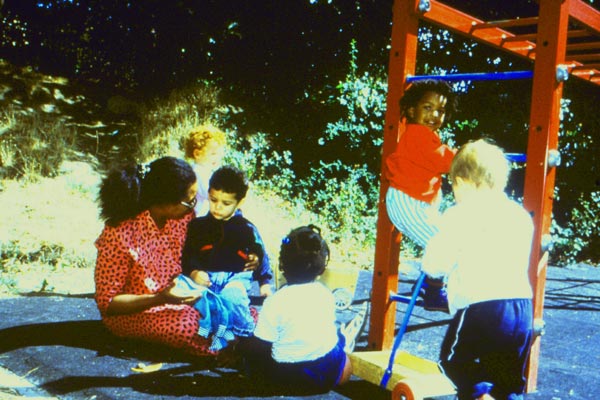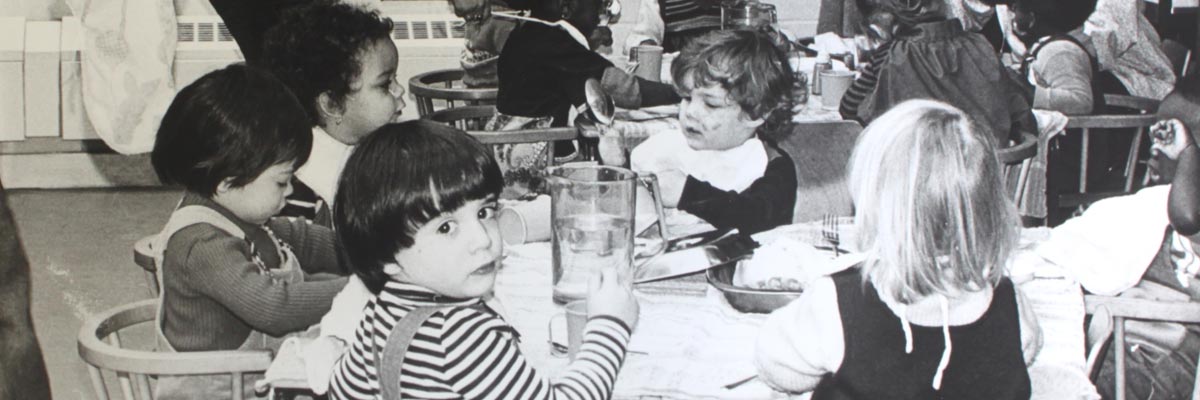In 1986, under the Thatcher government, both the Greater London Council (GLC) and ILEA were abolished, and the funding and management of schools were handed over to the local boroughs. When ILEA handed over the management of Maxilla Nursery School to RBKC, Judy Wilcox remembers they referred to it as ‘the jewel in their crown’ and insisted the Borough should ‘take great care of Maxilla’.
Although the founders are unable to pinpoint a particular date, shortly after this, borough representatives met with voluntary organisations to discuss future funding arrangements; funding would now be made by awarding contracts rather than grants. Up to this point there had been a culture of forming partnerships and supporting one another within the voluntary sector.
However the ‘contract culture’ put community organisations in competition with one another and with borough services; it was now the Borough that set the agenda, not the community. As a councillor commented at the time, ‘He who pays the piper calls the tune’.
In the late 1990s, a succession of cuts were implemented by the Council, which targeted services provided for the under 5s. In order to fulfil Social Services funding criteria, Maxilla now needed to take children in need living outside its catchment area; in addition, the founders reflect that an unintended consequence of the introduction of Working Families Tax Credit in 1999 enabled the Borough to justify cuts to funding, as the centre now received some payment directly from parents. It was the dawn of a new culture and challenged the original vision and ethos of the centre.
An interview with Ed Hewens,
former parent and governor
of Maxilla 2003-2010
Excerpts from an interview on 15/12/2015 — 8min 24sec
View interview summary PDF
Cuts, changes and challenges

Amidst all these cuts, changes and challenges, in the 1990s the new headteacher of the nursery school adopted conventional school day and term-time only contracts for the school staff. This deeply affected the way Maxilla operated. Wanting to continue supporting parents who were working or studying, WNA took over wrap-around care for the nursery school children, subsidising the out-of-school provision for 3 to 5-year-olds. It proved an impossible challenge to find additional funding to cover these costs in an atmosphere of continual cuts, and this is described by the founders as ‘a big nail in Maxilla’s coffin’.
For the next few years the centre managed to make ends meet, navigating its way through further cuts to grants, as well as an abortive attempt by the Borough in 2003 to close both Maxilla and Ainsworth Nursery Schools.
In the Guardian newspaper, 22 January 2003, Polly Toynbee commented: ‘Educational opportunity should begin in childhood, not at university’ and ‘ … pre-school provision appears to be in disarray … The Maxilla nursery in deprived North Kensington is a model children's centre founded 30 years ago, with all the facilities for nursery teaching and childcare, afternoon clubs and breakfast clubs, behaviour management groups for parents with difficult children and much more. The council has just told them they are among many local pre-school places to be cut … This is just one of many councils closing day care: their excuse is alarming. They say poorer parents can claim childcare tax credits and buy the day care privately so council-run facilities can shut.’ She went on to comment that, ‘… Britain's real educational future is in Maxilla and not Oxford …’
An interview with Judy Wilcox
and Mike Locke, Founders of
Maxilla Nursery Centre
Excerpts from an interview on 09/12/2015 — 16min 03sec
View interview summary PDF
Drawing on its reserves to run the Under 3s and parent services, and to subsidise the out-of-school provision, by the summer of 2006 WNA was struggling to operate and the Under 3s sadly closed in October that year. This came as a shock to many parents who had children at the centre and had chosen Maxilla because of its integrated offer.
The Borough stepped in and sought to offer alternative childcare places in their Family Centres. Historically these served in need and high priority children and their families. As one parent put it, the former Maxilla children were their ‘paying guests’.
‘Maxilla was created by the community for the community’.
Jenny Williams, Maxilla Nursery Centre founder




